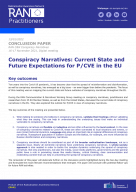Details
- Publication date
- 14 January 2022
- Author
- Directorate-General for Migration and Home Affairs
- RAN Publications Topic
- Alternative and counter narratives
Description
Two years into the Covid-19 pandemic, it has become clear that the spread of misinformation and disinformation, as well as conspiracy narratives, has emerged as a big issue – an even bigger than before the pandemic.
The focus of this meeting was on mapping the current state and future outlooks of conspiracy narratives throughout the EU. During the RAN Communication & Narratives Working Group meeting on conspiracy narratives, practitioners and researchers from 25 EU Member States, as well as from the United States, discussed the current state of conspiracy narratives in the EU. They also explored the outlook for P/CVE in view of conspiracy narratives.
The key outcomes of the meeting are presented below.
- When talking to someone who believes in conspiracy narratives, validate their feelings without validating what they are saying. This can help in understanding the underlying issues that make an individual vulnerable to conspiracy narratives.
- Conspiracy narratives are flexible and adaptive and are often influenced by the local context. In the case of conspiracy narratives related to Covid-19, these are often connected to local situations and events, or even (local) historical dynamics. Language also plays an important role in regional differences of conspiracy narratives. Russophone population in Eastern Europe and the Baltics, for example, are more influenced by Russian disinformation and conspiracy narratives.
- Conspiracy narratives should be considered as part of the broader radicalisation landscape, not as a separate issue. Nearly all extremist narratives have underlying conspiracy narratives. A whole-society approach is also needed in order to tackle the complex dynamics underlying the spread of conspiracy narratives. Not only practitioners, but also the media, social media platforms, governments and the general public have a role in promoting issues like media literacy, critical thinking, clear communication and moderating content that can help in preventing the spread of conspiracy narratives.
The remainder of this paper will elaborate further on the discussion points highlighted during the two-day meeting and formulate the most relevant recommendations that emerged. The paper will conclude with potential follow-ups for future RAN activities.

